Gold, Sugar, Tobacco:
The Stuff of the Early Modern Atlantic World
Revised schedule for Zoom conference
Friday, April 30, 2021
10:30 AM – 11:45 AM Law, literature, and economics
Edward Holberton (Bristol), “Liberty, Law and Lyric in The Barbados Gazette”
Nathan Nikolic (Graduate Center), “‘They fear they are bought and sold’: Leveller Entanglements with England’s Early Slave Trade”
Feisal G. Mohamed (Yale), “Godly Mammon: The Logic of Anti-Monopolist Puritan Slaving”
11:45 – 12:30 PM Lunch
12:30 - 1:45 PM: The cultural impact of commodities
Domna C. Stanton (Graduate Center), “Enslaved to Chocolate: Material Culture and Emergent Frenchness”
Valerie Forman (NYU), “Sugar and Enslaved People, Productivity and Aesthetics”
Eric B. Song (Swarthmore), “Bitumen: That Other Stuff of the Early Modern Atlantic”
1:45 – 2:00 PM Coffee/tea break:
2:00 – 2:45 PM: Dynamics of the slave trade and rivalry with Spain
John Donoghue (Loyola Chicago), “The Royal African Company, the ‘company of buccaneers’ and the ‘free trade in slaves’”
Herman L. Bennett (Graduate Center), “Representing ‘Black’ Stuff: Finance, Fiscal Crisis, Labor, & Early-Modern Political Economy”
3:00-3:15: Break
3:15-4:00 PM (9:15-10AM, Saturday, Auckland) Categories of emerging empire:
Russ Leo (Princeton), “Spinoza’s Dream, Caribbean Slavery, and the Emergence of Political Economy”
Jonathan Scott (Auckland), “Agricultural Imperialism”
Abstracts
Russ Leo, “Spinoza’s Dream, Caribbean Slavery, and the Emergence of Political Economy”
This paper begins with a deceptively simple question: did the architects of the emergent sciences of political economy in the seventeenth and eighteenth centuries consider slavery a form of labor? There is no doubt, of course, that the labor of enslaved people was absolutely integral to the development of translatlantic capitalism, that the trade in sugar, among other commodities, had precisely the financial and cultural impact it did in the Dutch Republic and England because of slavery. But how did slavery relate, if at all, to new theses on work, affect, and interest with which philosophers and politicians explained the rapid and epochal transformation of daily life between the 1650s to the 1720s? In this paper I give an overview of how slavery and race figured in early economists’ attempts to calculate time, value, and labor as well as the rare circumstances under which the affects, interests, and activities of enslaved people were recognized as integral to early capitalism across the Atlantic World. Looking carefully at key works by John Locke, Pieter de la Court, and Bernard Mandeville, I show how their foundational theses on labor and value rely on notions of interest, agency, and property that constitutively obscure the labor of enslaved people as such—that is, as labor. That is to say, in these foundational works of political economy, the slave is paradoxically not seen as a laborer. I turn next to Baruch Spinoza’s 1664 letter to Pieter Balling, illustrating the degree to which Spinoza was haunted by this problem. Spinoza’s dream is symptomatic of a larger tendency in treatments of affect and interest in the period, accounts that attempt to explain the lived experience of capitalism but which nevertheless relegate slavery to a counter-modernity with an alternative account of time, value, and feeling.
Jonathan Scott, “Agricultural Imperialism”
My title is inspired by Alfred Crosby’s classic Ecological Imperialism. That book taught historians of empire to pay attention less to colonisers themselves than to what Crosby called their entire travelling field of biota. My subject here is the impact of one peculiar species of British colonisation resulting not from any resources that it contrived to extract, but rather its successful global export of a European way of life.
Three features distinguished British colonial settlement in temperate Ireland and North America from its plantations in tropical Barbados, Jamaica and India, and also from Spanish, Dutch and French possessions. The first was the establishment of colonies as confessional outposts of (predominantly Calvinist) Protestantism: a planting of people rather than things. This began in Ireland as a government-sponsored instrument of imperial control, but it continued in North America as a means of security and refuge from the Stuart crown itself. The second feature of English colonisation was its deployment as a means of offloading surplus population. Between 1540 and 1640 the population of England and Wales doubled; between 1700 and 1800 it doubled again. These developments propelled the demographic transformation of London, from 55,000 people in 1560, to 550,000 in 1700, and 1 million by 1800. They also set in motion a flood of migrants to all the English settlements of the Atlantic world. Between 1630 and 1642, 120,000 English and Scots migrated to Ireland, 60,000 to the English Caribbean, and 20,000 to North America. Between 1640 and 1780 one and a half million British settlers migrated to the Americas.
The third distinguishing feature of this planting of people was social and economic. As in Spanish central and South America, Dutch and French North American colonies were established primarily to harvest resources, in particular timber, furs and fish. The same was true of the Russian Empire in Siberia and the North West Pacific. For the demographically expansive North American British settlements, however, what was essential was the practice of settler agriculture. In the words of one seventeenth century observer, the Dutch `did never much thrive in planting’. They were interested only in war and trade, `not in clearing, breaking up of the ground, and planting as the English have done.’ As a result, whereas Dutch merchants, `keeping themselves most within their own Cells, and Ware-houses…mind[ed]…their gain alone’, the English abroad `carried their way of life with them, establishing it in the new communities they encountered.’
By 1740 the population of Pennsylvannia was increasing by 150% per decade, something only sustainable in an agricultural society by expansion of territory. The resulting westward push into the Ohio River valley provoked the Seven Years War of 1747-54. One unintended biproduct of this demographically explosive, territorially expansive agricultural imperialism appears to have been the industrial revolution. But its more immediate consequence was the territorial dispossession of native peoples. Of course all colonisation involved both migration and the appropriation of resources, including territory. But not all involved the global metasticization of a particular way of life, and with it a veritable paving over of large parts of the world. Because the planting of people and culture required land which was also everywhere the foundation for indigenous cultural practices and lifeways, the price paid for the export of one culture - in North America, Australasia and elsewhere - was the destruction of many others.
Domna C. Stanton, “Enslaved to Chocolate: Material Culture and Emergent Frenchness”
Louis XIV’s Spanish-born wife was addicted to chocolate, among all things Spanish, writes Montpensier, who rejected invitations to the Queen’s Collation: “I like dishes in the French style.” Part of the cultural process of defining the national “we,” against Spain, France’s rival as “most Christian nation,” the Queen had to be othered: “she could never get used to our dishes.” Compounding the foreignness of chocolate, expelled Iberian Jews introduced chocolate making to South-Western France, though forbidden from touching the market-place food of Christians. Chocolate was also identified with Jesuits in New Spain, who, Saint Simon recounted in 1701, transported bars of gold, covered in finger-thick layers of chocolate, from the colonies to Cadiz. Like other missionaries, Jesuits instantiated colonialism’s contradictions between commerce and conversion, the ideological alibi that France trafficked slaves from Africa to the Caribbean only to save heathen souls.
By 1655, du Buc had been shown the only cacao tree on Martinique by “savages”; later he reclaimed his French nobility for detaching slaves to show settlers the process of chocolate’s production. In 1695, engineer Froger left La Rochelle ready “to fight for the nation’s glory, make a fortune or perish,” purchased slaves in Senegal, and reached Martinique, whose “Cacao... supplies all of France.” As in most Relations, except Labat’s (1722), Froger never details the process of production; instead, he deploys the trope that “there are no slaves in France,” which “abhors servitude over all nations,” and condemned its imperial rivals for their inhumanity to slaves, still defined as meubles in the 1685 Code Noir. Jesuit Bouton insisted that slaves were happy to be in bondage to the French, who “treat them gently and among whom they will learn what constitutes their salvation.” Yet he defined les negres as a miserable “nation” that appears to exist for the sole purpose of slavery; “they belong to the slave race,” he stated, signaling an emerging racialism that culminates in Bernier’s “New Division of the Earth” (1684) by race.
Favored by les grands, Le Mercure Galant (1682) reported that chocolate was served at Versailles receptions three times a week; and a lottery winner received from Louis XIV’s brother “a silver hot chocolate serving bowl, one in porcelain, seven bars of chocolate and one box of tea.” However, the less “grand” were also consuming chocolate: a 1659 edict had granted Toulousain Chalieu exclusive national rights to produce and sell “a certain composition that is called ‘chocolat.’” When his privilege was reduced, other chocolatiers quickly appeared, and Sieur Renaud sang its virtues in Paris streets. Massialot’s Le cuisinier royal et bourgeois (1693), which aimed to make the most fashionable stews (including chocolate desserts) accessible to bourgeois families, extolled “the superiority of Europe, especially France over all continents and nations for its good taste and for doing justice to the marvelous gifts …of other climates…; in France …we can boast of prevailing over all nations in this area, as we do in polish and politeness and a thousand other well-known advantages.” Politeness and polish perhaps, as part of emergent Frenchness, but certainly not justice for the enslaved, from which the sanitized “gift” of chocolate flowed into fashionable porcelain cups.
Valerie Forman, “Sugar and Enslaved People, Productivity and Aesthetics”
Reading literary, economic, and political texts from early modern England and the West Indies, this paper explores the complex relationship between plantation development and the establishment of a functioning social order in the wake of both a civil war and the development of a colonial system that positions itself to benefit from a radically different set of resources. In particular, I trace the ways that ideas and practices of colonial development, especially in the form of sugar plantations, rely on an aestheticization of the two most significant commodities to colonial development in the West Indies--sugar and slaves. This talk explores how the aesthetic serves as an organizing principle of a social order newly dependent on ideas of productivity and proper management in which a world order based on accumulation is imagined as fundamentally anti-tyrannical and thus free. In listening for echoes in these texts of the lives of enslaved people as neither commodities or abstractions, I also work to explore concerns about justice and immobility that the mobilization of the aesthetic seeks to displace. Finally, I turn to Kara Walker’s 2014 installation, A Subtlety or The Marvelous Sugar Baby, an Homage to the unpaid and overworked Artisans who have refined our Sweet tastes from the cane fields to the Kitchens of the New World on the Occasion of the demolition of the Domino Sugar Refining Plant, in order to consider the complexity of contemporary aesthetic challenges to the “laws” of accumulation and the dislocations it produces.
Eric B. Song, “Bitumen: That Other Stuff of the Early Modern Atlantic”
Diego Álvarez Chanca’s account of Columbus’s second voyage notes that the Taíno set gold in bitumen (betún): “They could not make their masks without it.” This paper describes how bitumen functions literally and conceptually as the dark counterpart of gold. Gold promises intrinsic worth and nearly unlimited purchasing power. Bitumen, by contrast, is mucky stuff that is indispensably useful—not just for setting gold masks but for making ships watertight. When Walter Raleigh arrived in Guiana, he sought to reach the elusive city of gold that the Spanish had not yet conquered. What he actually did find was a spring of “stone pitch or bitumen” about ten leagues way from the Spanish port at Trinidad.
Awareness of the history of bitumen in the New World continues to circulate in the petroleum industry; the Shell Bitumen Handbook briefly recounts the historical facts mentioned above. This paper concerns how the discovery and use of bitumen in the New World enters the religious imagination of seventeenth-century England. Bitumen overflows neat lexical distinctions: whether bitumen is identical to pitch, tar, and asphalt are complex questions. This technical matter involves biblical translation as well as petroleum refinement. The Hebrew Bible uses the word kopher to refer to pitch only once, when God commands Noah to cover the ark with a waterproof coating. In all other usages, the word refers to atonement or a ransom. By contrast, the word chomer is used to describe the asphalt used to construct the Tower of Babel and the pits into which some kings of Sodom and Gomorrah fall as they flee from Chedorlaomer. For these latter accounts, the translators of the King James Bible use the word “slime”; they use “pitch” to describe the coating that Noah applies to the ark. Yet no stable distinction between pitch and slime obtains: in Exodus, the wicker ark that preserves Moses’s life is covered “with slime and pitch.”
This paper turns to John Milton’s Paradise Lost as a work that negotiates these questions about biblical translation to comment critically upon European exploits in the New World. When the first book describes the fallen angels refining gold in their new world, Hell, it does not mention bitumen. Milton does, however, use the image of asphalt twice over to link hellish realities to the earthly world to come. If time permits, this paper will close with the speculation that the ambivalences surrounding bitumen would inform racist discourses and practices. It is in the New World that tar—through the old practice of tarring and feathering and through the imported story of the Tar-Baby—would become racialized in ways that blur the lines between moral sensibilities and physical bodies.
Edward Holberton, “Liberty, Law and Lyric in The Barbados Gazette”
This paper looks at the reception of early modern literary texts in The Barbados Gazette, in the context of the development, in the later seventeenth century, of the legal framework for the “large integrated plantation model” of enslaved labour. The Barbados Gazette circulated across the Anglophone Caribbean and some American colonies. It offers rich insights into the entangled development of political, legal and cultural institutions in the early modern and early eighteenth-century Atlantic. It was closely connected to the island’s Attorney General and legal community, and published many essays on legal topics, but it also included poems, especially amatory lyrics by women writers, and extracts from drama. This paper looks at how lyric and law were connected by Barbadian readers, and how in the newspaper’s pages, literary reading helped to naturalise, disguise, and occasionally expose the specialisation of the colony’s legal institutions.
I begin by looking at literary pastimes and reception in Barbados in the context of the colony’s fraught political culture, and an empire-wide dialectic of legal convergence and divergence. The divergence became particularly acute in early modern Barbados, which pioneered the “large integrated plantation model” of sugar cultivation. This system depended upon the development of a parallel legal system of spectacular punishment in order to function: Barbadian planters sought to control a black population which was much larger than the colony’s white population. At the same time, especially following the 1688 revolution, the idea of a Panatlantic system of law and liberty became vitally important to English and British imperial identity. The poetry printed in the Barbados Gazette becomes part of the argument that metropolis and colony share the same legal culture, despite the latter’s legal innovations. I look especially at the reception in the newspaper of amatory lyrics of Martha Fowke Sansom. They were taken from a series of poems originally written to an Inns of Court lawyer who travelled to Barbados. They are rich with legal imagery, and are extensively discussed and reframed in the editorial commentaries of the Barbados Gazette. The editor exploits Fowke Sansom’s interest in sociability to draw elite Barbadian readers into a virtual coterie. His editorial interventions suggest connections of sympathy and refined feeling between members of the Barbados elite and members of the inns of court milieu from which the lyrics originated. At the same time, the editor is evidently wary of where these passions might lead, and his paratexts seek to constrain and direct reader interpretation. In their colonial reception, these poems are transformed into vehicles of transatlantic sociability, and help to align the legal cultures of metropolis and colony.
Nathan Nikolic, “‘They fear they are bought and sold’: Leveller Entanglements with England’s Early Slave Trade”
As part of a larger inquiry into the influences of expanding colonial trade on domestic politics during England’s Civil Wars, this paper makes a case for reading certain Leveller tracts alongside the expanding tobacco, sugar, and slave trades in the 17th-century Atlantic. The first part of the paper highlights historical connections between Leveller figures and colonial traders, taking famous radicals William Walwyn and Col. Thomas Rainborowe (or Rainsborough), and their mutual acquaintance, Richard Shute, as case studies. Shute was a leading radical within London’s city government, as well as a successful colonial merchant with close ties to the sugar, tobacco, and slave-trading entrepreneur Maurice Thomson (or Thompson). The second part of the paper will consider some of Walwyn’s works, alongside other Leveller documents, for traces of these organizational connections. Walwyn, while formally a member of the Merchant Adventurers Company, was an ardent anti-monopolist and advocate of free trade. His political and rhetorical positions will be considered alongside his and other Leveller relations to an economic sphere increasingly permeated at all levels by an intricate global market.
In particular, I’ll be looking at Walwyn’s pamphlet, “Some Considerations Tending to the Undeceiving,” printed on the 10th of November 1642. This date likely coincides with the beginning of Walwyn’s association with Shute. On November 26th, the Commons adopted a resolution to establish regular weekly assessments to fund the war effort. A committee was established at Haberdashers’ Hall and Richard Shute sat on the subcommittee at Weavers’ Hall, where he was appointed treasurer for the London parishes. That same month, November 1642, Walwyn was appointed the Vintry ward member to this committee. On November 13th, the House of Commons Journal records “That divers Gentlemen of the City of London were at the Door,” led by a merchant, Richard Shute, to present a petition. They spoke “in the Language of many Thousands; That they fear they are bought and sold.” I’ll also be looking at the petition presented by Shute and his associates to Common Council on March 29th, 1643. This petition, as scholars have noted, shares much with future Leveller writings, including, perhaps, the first public claim “That originally the Supreme power” is “in the whole people.” In his “A Whisper in the Ear of Mr. Thomas Edwards, Minister” (13 March 1646), Walwyn suggests that he was closely involved in organizing the petition, and that he perhaps even had a hand in drafting it.
It may no longer surprise the historian to learn that those seemingly most dedicated to the rights and liberties of the English subject in the early 1640s worked side by side with pioneers of the British slave trade (in fact, sometimes the same individual could do both). In his book, The Levellers, published in 1955, Joseph Frank identifies the Protestant Reformation, particularly its Calvinist strains emphasizing purposive activity, and a rationalist belief in a law of nature as the two main philosophical influences on Leveller thought and politics (3-7). Without dismissing the validity of accounts that emphasize intellectual traditions, I suggest that an investigation of radical thought during the 1640s that centers around the intensification and diversification of England’s transoceanic economic ties might illuminate early links between the discourse of popular sovereignty, the expansion of global capitalism, and the construction of Britain’s early empire.
Feisal G. Mohamed (Graduate Center), “Godly Mammon: The Logic of Anti-Monopolist Puritan Slaving”
This paper takes as its starting point the tendency with which the socialist historian R.H. Tawney wrestles in Religion and the Rise of Capitalism (1922): how is it that economic and social concerns are transferred in the seventeenth century from the sphere of religion to that of the state? Tawney is particularly concerned with the transformation of Puritan thought within this larger narrative, and that ways in which the Puritanism of the first half of the seventeenth century, with its firebrand impulse to reform society top to bottom, abandons by the Restoration a sense of social and economic mission.
As Tawney himself recognizes, there was never a time in the history of Puritanism where God and mammon were not entwined. Consider Providence Island Company, active in the 1630s, a venture of the men who would become leaders of the Puritan opposition in the Long Parliament: the list of company members includes Lord Brooke, John Pym, Sir Nathaniel Rich, Sir Benjamin Rudyerd, and Oliver St.John. The project was very much conceived as an effort to set up a godly colony in the heart of the Spanish New World—this was not the wisest plan: the colony had to fight off several invasions before falling to Spanish attack in 1641. Planters rapidly invested in human property, so that by the time the island fell in 1641, the Spaniards captured 381 slaves and about 350 English colonists. As Karen Kupperman notes, Barbados and St Kitts would not reach such a high proportion of slaves in the total population until the 1660s and 1680s, respectively.
The commercial impulses of left-leaning Protestantism gain fuller expression under the Commonwealth, which passes the Navigation Act a short two years after its inception and uses the Spanish invasion of Providence Island as pretext for the militarism of the Western Design. We will be especially interested in Slingsby Bethel, a strident supporter of the Navigation Act active in the Hamburg branch of the Company of Merchant Adventurers, who draws a tight connection between free trade and liberty of conscience, most visibly in his 1671 tract The Present Interest of England Stated. Through Bethel we see the workings of a logic of godly free marketeering: because no nation can be formidable without trade, it is a pursuit in the public interest, and so monopolies and other obstacles advance the “private, worldly, and carnal interest” of corrupt Counsellors and ministers of state.
Bethel has been associated with John Bunyan, so it is not amiss to explore traces of anti-monopolist dissenting culture in The Pilgrim’s Progress. Here we will focus especially on Christian and Hopeful’s encounter with Flatterer, a scene with complex racial dynamics, and draw a contrast to Behn’s Oronooko, a text receptive to the kind of slavery practiced by the Royal African Company, a monopoly with close ties to the royal court. This to bring to the surface the several logics of racialized slavery at work in the period, each responding to a particular set of concerns if also all tending toward the same disastrous result.
John Donoghue, “The Royal African Company, the ‘company of buccaneers’ and the ‘free trade in slaves’”
In contrast to the current literature, “free trade” has a history that verged far beyond Parliamentary debates, colonial mercantile policy, and the writings of early political economists. The rise of free trade in the early modern Atlantic has a labor history that is at least as important as its discursive and high political contexts. As my paper argues, free trade’s origins are embedded in the experiences of those forced into servitude, slavery, and military service in the Caribbean.
By the late seventeenth century, public and private interests realized that Britain’s colonial future depended on becoming a dominant power in the transatlantic slave trade. Britain’s imperial nemesis, Spain, understood this as well, and forbade British merchants and most others from beyond Spain from selling slaves in its American colonies. In response, King Charles II ordered the Jamaican governor, Lord Windsor, to "force open a free trade in negroes" in Spanish America in 1662. Such force required the mobilization of military labor, although instead of dispatching conventional forces, which were expensive and in short supply, Windsor commissioned the "company of buccaneers" to attack Spanish shipping and the Spanish Main itself.
Not long before, the buccaneers, calling themselves “the Brethren of the Coast,” had formed what they saw as their own sovereign society, consisting of forced laborers who had escaped plantation servitude, debt peonage, slavery, and service as military conscripts to find freedom in piracy and security from future bondage in ‘the Brotherhood.’ Serving on their own terms as mercenaries for the Jamaican colonial regime, these pirates provided free (as opposed to conscripted) military labor, destroying and pillaging Spanish American forces, fortunes, fortifications, and shipping. Buccaneers also morphed into a commercial workforce, paid not in wages like most seamen, but in the shares that they demanded from the piratical spoils. Buccaneer ships creaked under the weight of gold, silver, and enslaved Africans, which pirates traded and sold all over the Caribbean, especially Jamaica. The timing of this lucrative, state-sponsored commercial terrorism was crucial, as wars between the British, Spanish and Dutch had disrupted trade with Europe and the transatlantic slave trade to the Caribbean, leaving labor hungry planters without slave labor and startup capital.
Pinioned in part on the theft of African bodies, the freedom of the buccaneers proved as fleeting as the fortunes they drank up and gambled away in the taverns and grog shops of the Caribbean. In the 1670s, after buccaneer attacks forced Spain to begin opening its markets to British slave traders, the pirates were no longer assets to plantation capitalism. Instead they became threats by resisting British efforts to restrain their raids on the Spanish Main. The Royal Navy and colonial vice-admiralty courts targeted them for destruction, marking a critical turning point in the history of early modern political economy.
Herman L. Bennett, “Representing ‘Black’ Stuff: Finance, Fiscal Crisis, Labor, & Early-Modern Political Economy”
The fiscal crisis of the Spanish Empire, alongside the emergence of new financial instruments, engendered a robust economic discourse among royal officials, arbitristas, and theologians in the sixteenth and seventeenth centuries. In New World Gold: Cultural Anxiety and Monetary Disorder in Early Modern Spain, the literary scholar Elvira Vilches has brilliantly reconstructed these often-simplified discursive formations, situating them in their respective ‘problem-spaces’ while keenly analyzing the subtleties of the emergent genres of economic writing. In attending to the “explosion of economic writing,” Vilches has brought into relief the focus on gold, notably ‘New World Gold.” “New World Gold,” writes Vilches, despite the treasure ships producing spectacles and rumors of abundance engendered a crisis of confidence in Spain and the Spanish Empire, precisely since speculation, inflation, credit, and usury followed.
“Representing ‘Black’ Stuff: Finance, Fiscal Crisis, Labor, & Early-Modern Political Economy” utilizes Vilches’ layered historical reconstruction as an opening to query how did Africa—long before the New World seen as a principal site of gold production—alongside the two-hundred thousand Africans introduced into the Spanish Indies during the sixteenth century as black slaves figure in this “explosion of economic writing?” In an effort to discern if and how Africa, Africans and blacks in the New World were represented in the economic writing of the period or related genres that touched on the imperial economic, this paper navigates chronicles, royal orders, correspondence of the viceroys, census data that touch on the slave trade and slavery and the ways that contemporaries and scholars today configure the slave in both the story of the Spanish Empire and early modern capitalism.




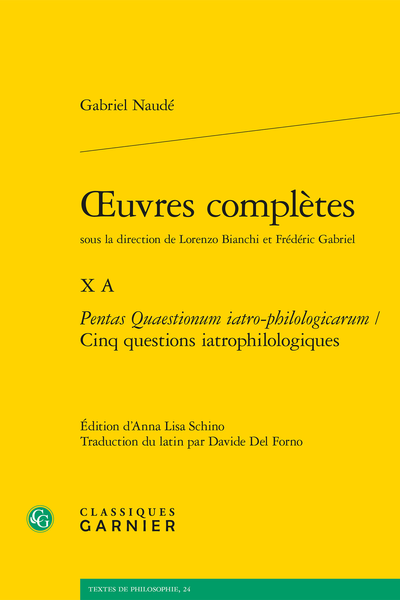 Gabriel Naudé, Oeuvres complètes, tome X A: Pentas Quaestionum iatro-philologicarum / Cinq questions iatrophilologiques, éd. Anna Lisa Schino, Paris, Classiques Garnier, 2024.
Gabriel Naudé, Oeuvres complètes, tome X A: Pentas Quaestionum iatro-philologicarum / Cinq questions iatrophilologiques, éd. Anna Lisa Schino, Paris, Classiques Garnier, 2024.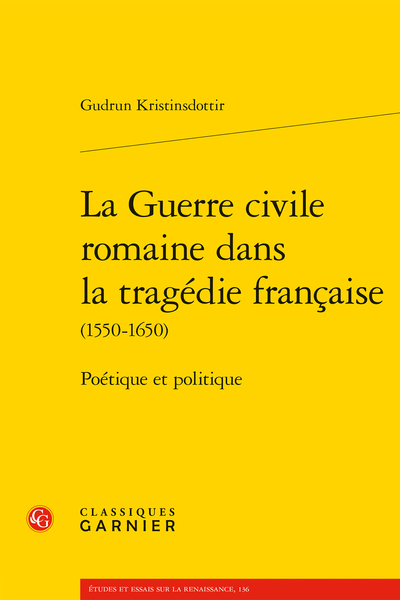 Gudrun Kristinsdottir, La Guerre civile romaine dans la tragédie française (1550-1650). Poétique et politique, Paris, Classiques Garnier, 2024.
Gudrun Kristinsdottir, La Guerre civile romaine dans la tragédie française (1550-1650). Poétique et politique, Paris, Classiques Garnier, 2024.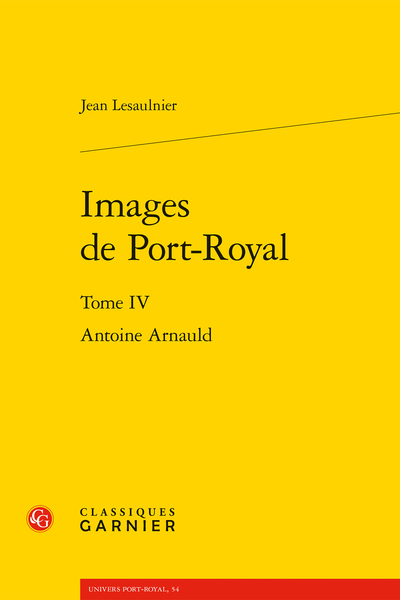 Antoine Arnauld, Images de Port-Royal. Tome IV, éd. Jean Lesaulnier, Paris, Classiques Garnier, 2024.
Antoine Arnauld, Images de Port-Royal. Tome IV, éd. Jean Lesaulnier, Paris, Classiques Garnier, 2024.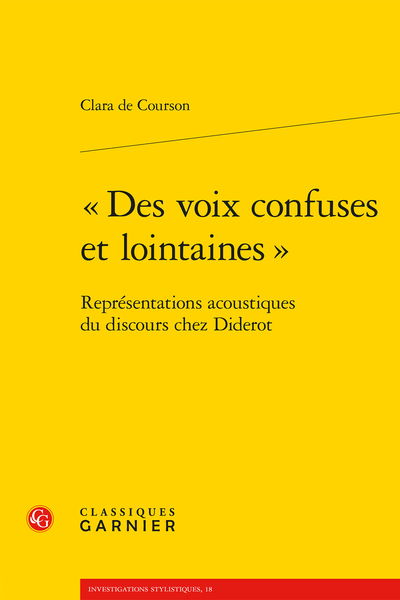 Clara de Courson, « Des voix confuses et lointaines » Représentations acoustiques du discours chez Diderot, Paris, Classiques Garnier, 2024.
Clara de Courson, « Des voix confuses et lointaines » Représentations acoustiques du discours chez Diderot, Paris, Classiques Garnier, 2024.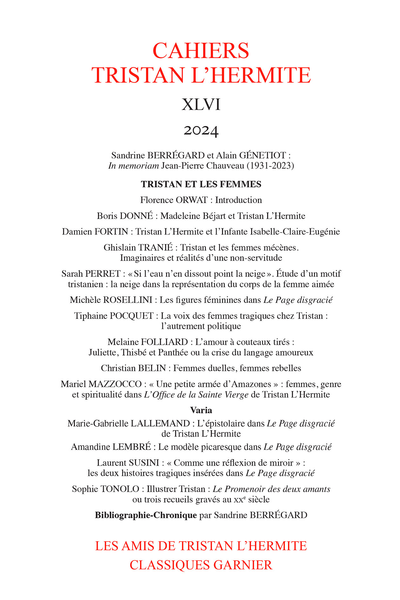 Cahiers Tristan L’Hermite, 2024, XLVI : "Tristan et les femmes"
Cahiers Tristan L’Hermite, 2024, XLVI : "Tristan et les femmes"